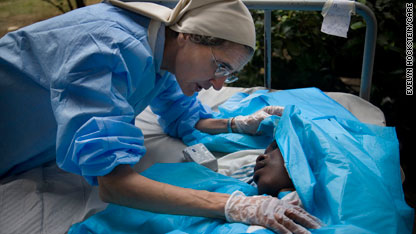
However, relief agency workers can suffer the same psychological trauma as the people they are helping. And they often ignore these feelings in the face of the work at hand.(CNN) -- For people in the business of coming to the rescue, it's easy to lose sight of their own mental health as they work around the clock to help those desperately in need. The intensity of being dispatched to a mass emergency can cause volunteers to develop problems that include sleep disorders, social withdrawal, substance abuse, anxiety and difficulty trusting people. They may try to lose themselves in their work, even if that work is what's stressing them. Aid organizations in Haiti know about this phenomenon, called vicarious trauma, and they're preparing for it. After the first week on the ground, volunteers for CARE are showing signs of the trauma, said Wills Moore, director of human resources business partnerships for CARE. He has been getting reports from people who are either really unemotional or really emotional all the time, which could be signs of vicarious trauma.
"People might either shut down emotionally or get very sensitive emotionally and cry at the drop of a hat," said Laurie Anne Pearlman, former president of the Trauma Research, Education, and Training Institute Inc. and author of several books about vicarious trauma. "The hallmark of both direct and indirect or vicarious trauma is disrupted spirituality, a loss of meaning or hope."
Many people on the staff at CARE are going through trauma, and some have lost relatives, said Rigo Giron, associate vice president for strategic initiatives at CARE.
"It's a hard place for them because they are committed to provide relief, but at the same time they need to recover from the trauma they face. They're very stressed," he said. "They're very traumatized. It's hard for them to overcome that."
Mental health specialists with the American Red Cross are primarily in Haiti to work with earthquake victims, but are also looking out for fellow volunteers, said Jonathan Aiken, spokesman for the Red Cross.
The University of Miami's Project Medishare also is coordinating the travel of mental health professionals to Haiti beginning next week to help quake victims, but also to assist other aid workers if needed, a representative said.
Disaster and emergency workers often get an adrenaline rush that powers them to work without rest. That, combined with a strict ethic of working as much as possible, is "a recipe for trouble" for both the helpers and the people they're serving, Pearlman said.
"After we're overworked for a certain amount of time, as we all know, our brains don't work as well, and we're not making such good judgments, we're not making such good decisions, and then pretty soon you're on the list of people who need to be taken care of, rather than the list of people who can help," she said.
It helps to have people encouraging volunteers to take breaks now and then, although it's also hard for the workers amid the disaster relief to heed that message, she said.
This is the kind of advice that Moore said he received before his departure for Haiti on Wednesday. A staff psychologist told him to try to make himself take breaks while doing earthquake relief -- for instance, exercising, reading or otherwise getting away from the situation briefly. Journaling and communicating with family and friends are also "good, almost cathartic ways" of coping, Moore said.
Aid workers and volunteers who have psychiatric histories, major life stresses or traumas of their own are more vulnerable to trauma in Haiti, and may need more help, Pearlman said. A personal trauma history in itself is not a bad thing -- and people in the trauma field are more likely to have one -- but it's a problem when they haven't worked through it, she said.
There are ways relief agencies can help: If an organization has policies restricting the number of hours before a break, or before leaving the disaster site altogether, that can help, she said.
"It's hard to say, 'Well, look, everybody, I see that you folks don't have food or water, but I need to go rest for a few hours,' " she said. "But it's very important to do it."
No comments:
Post a Comment